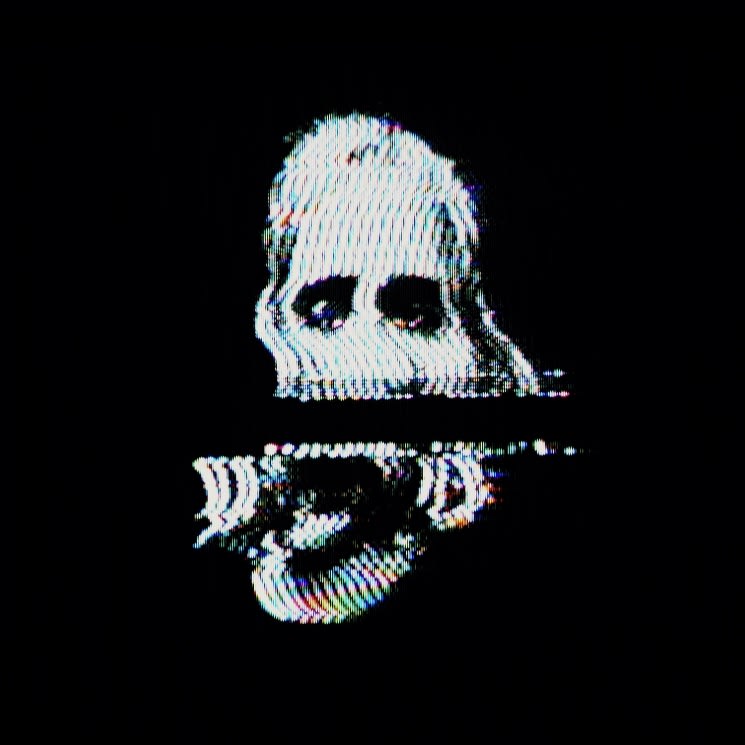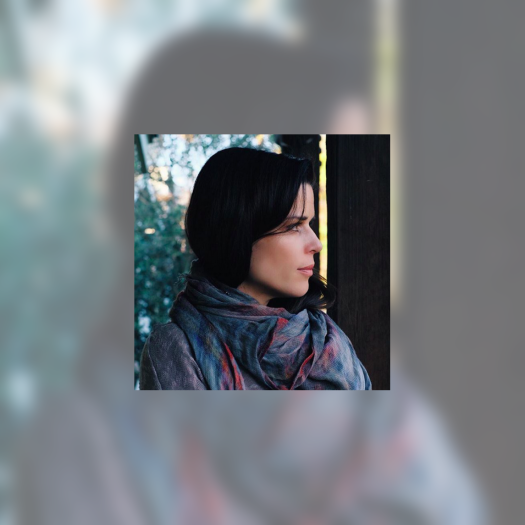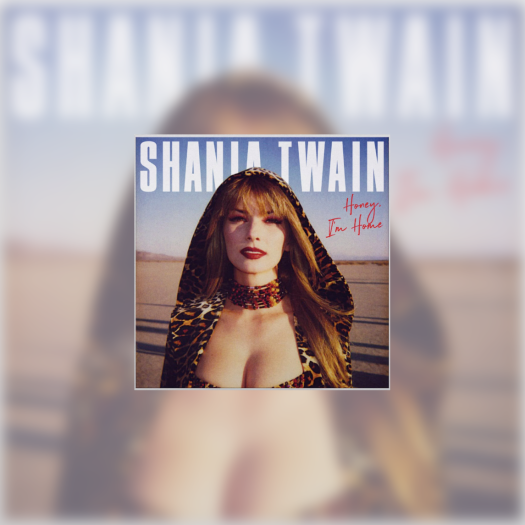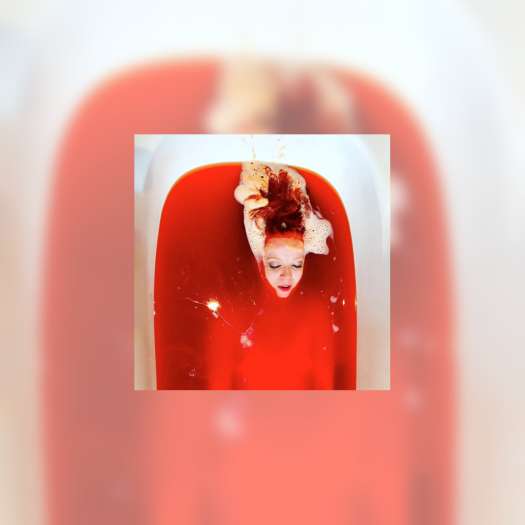I often ask people whether they have a person or a place to turn to when they feel so alone that life doesn't seem possible anymore. Having a safe place or person feels like crying at a bar alone and receiving a text that reads "Come on over!" And so you walk 30 minutes from one end of town to the other into an embrace, onto a shoulder that doesn't care about the blurry mess of mascara and foundation you'll leave splattered across it. It calms my heart to hear that others have such a person or place, even if I often feel like I don't. But the truth is that I do have safety — I merely forget this in moments of turbulence. Because who has time to remember the good when everything is bad, and vice versa?
In Your Blood, Toronto-based indie-pop artist Max Bergé's debut album as Castle Frank, seems conversant with this ability to forget, with our blinkered perspectives. Working in turn as a reminder and instruction manual, the album is a stunning and astute achievement, a tender work of art that celebrates and leads to safety through an exploration of what is certain: the good and bad that abide despite everything. In Your Blood is a brilliantly-composed, trenchantly-written examination of what we tend to forget to cherish during spells of goodness, or during the void-like badness that can threaten to eat us whole.
The wisdom contained within In Your Blood seems preternatural, too great for its bounds. Bergé began work on the album at 19, after arriving in Toronto from the West Coast. The young songwriter wrote the album's nine tracks so as to synthesize his experiences in his new home city. Produced by Nixon Boyd (of now-defunct Hollerado) and Matt Lederman (who's produced and mixed for the Rural Alberta Advantage), the album contains a weather-beaten wisdom, the kind of bravery that a person so young ought not to have shored up, at least not yet. That Bergé possesses the knowledge shared through In Your Blood is part and parcel of the album's gift.
In Your Blood charts a paradoxically circular human journey: beginning at a point of stability that already scans as hard-won, the album traverses new moments of harrowing weakness, the kind that threaten to strip one's sense of self, the will to keep oneself alive. The album lands where it began: at a kind of safety that Bergé knows isn't permanent, but that is sweet and haven-like nonetheless.
The album is all about celebrating and holding space for those things and people that exercise patience for us. The first two tracks, "No Resolutions" and "Just Kids," possess a newly-found nugget of truth that they joyfully cling to, returning to it again and again in syrupy choruses. "No Resolutions" shakes off steely problems and the strictures of dry and limiting intentions, which have a home in the always-fleeing future, to celebrate and find comfort in the warm and fluid mess of the simple present. "Just Kids" is a love letter to friendships that don't have an expiry date.
Despite everything — all the pain of individual existence — Bergé's steady voice, so much like Matt Berninger's, rejoices in the fact that though we might not viscerally need a person as we do water or food, it's nice to have them anyway. The gift of someone to come back to, someone who comes back, is celebrated again and again on In Your Blood. "Maybe I'll see you on a Saturday night / Knocking on my door with a bottle of wine," he croons on "Just Kids." "We don't need this at all," his voice confides, but we have it anyway, we "know you're gonna see me again."
Bergé fleshes out this nuanced delineation between what is required for base survival and the magical, uncomplicated interpersonal relationships we're lucky enough to forge on the sweetly balletic "Turn Around," and the later on "Next To You." These tracks ask of those beautiful friends to stay with us, even as we hurt and stumble and get swept up by the waves. On these tracks, Bergé taps into a pleading that, though sometimes dire and desperate, is simultaneously sober, making it all the more heartbreaking. Without lapsing into self-abnegation or a flagellating impulse, Bergé retains awareness of the self, that tendency to flounder, as he expresses love for others who allow for his safety.
On the other end of the spectrum, songs like "Nothing Like Me" and "Shallows" vividly dramatize survival — the battle against the consuming waves that always come, threatening to wash away all our hard work and the lives we've built to keep ourselves safe. "I wanna do better than this," Bergé sings on "Nothing Like Me," a track that speaks to the desire to expunge ourselves that sets in when feelings of safety have faded. "Can't take back all my mistakes / So just take me back to the water / Back to the sea / Walk back the miles of my wandering." This track is undergirded by mourning, funereal strings, underscoring how winsome this thinking can be.
And thus the floundering begins. On "Shallows," damnable and hounding and predictable as rain, tragedy is heralded by a hissing and gurgling of water, as if one is being pushed around by frothy waves. But this track has the tenor of survival, something certain that is present in the driving drums — the echo to Bergé's voice scans as hymnal and salutary and holy. As the lyrics wax dire ("If goodbye is too hard / Just slip out the back door / You don't owe me anything / And I hope I can say the same / I'll see you in another life / When we're both strangers again," Bergé sings in his grand voice), there builds up within this track the strength the album began with. Here, familiarity with the self's predictability is evidenced in its forgiving antidote: "When we wake up tomorrow / And don't wanna feel nothing at all / You won't have to let go / 'Cause I don't even plan to hold on." Waking up isn't a matter of if, but of when, and yesterday's pain doesn't have to be dwelt upon today.
It's the self-awareness of "Shallows," an acknowledgment of life's valleys and our tendency to grow tired and our desire to disappear, that is transmuted to self-respect by the album's end. On final track "Half Awake," Bergé reifies, without deifying, the self-destructive impulse, casting it in sympathetic light. "Losing yourself till you're drifting away," he sings of the desire to abandon control and to lose autonomy, the ability to bear witness to the self. But it's not all hopeless, because we have already been given the answer to survival by the earlier tracks, and are therefore better able to survive the abyss delineated by "Half Awake." Heaven is other people, this album seems to say, while hell is often the circles coiled within ourselves.
None of the songs tell us to ignore or forget our pain; rather, they show us how we might be happy alongside it, how, without navel-gazing, we might find home and safety. Those things that aren't necessary for survival, but save us when the needful things become weak and fallible. The title track beautifully communicates In Your Blood's thesis; in depicting the drama of fire and shadows following us through life, the track asks — as it ends in a punchy and hazy crescendo — that, instead of trying to forget the pain, we acknowledge it without the grand ambition of excising it. It asks that we learn to find communion and safety and joy, despite our weighted minds and our leaden marrow.
Castle Frank's debut is something more than a mirror throwing the garishness of our existence back to us — it's like a steady hand to hold in ours, one that helps us survive the lambasting valleys of our lives.
(Independent)In Your Blood, Toronto-based indie-pop artist Max Bergé's debut album as Castle Frank, seems conversant with this ability to forget, with our blinkered perspectives. Working in turn as a reminder and instruction manual, the album is a stunning and astute achievement, a tender work of art that celebrates and leads to safety through an exploration of what is certain: the good and bad that abide despite everything. In Your Blood is a brilliantly-composed, trenchantly-written examination of what we tend to forget to cherish during spells of goodness, or during the void-like badness that can threaten to eat us whole.
The wisdom contained within In Your Blood seems preternatural, too great for its bounds. Bergé began work on the album at 19, after arriving in Toronto from the West Coast. The young songwriter wrote the album's nine tracks so as to synthesize his experiences in his new home city. Produced by Nixon Boyd (of now-defunct Hollerado) and Matt Lederman (who's produced and mixed for the Rural Alberta Advantage), the album contains a weather-beaten wisdom, the kind of bravery that a person so young ought not to have shored up, at least not yet. That Bergé possesses the knowledge shared through In Your Blood is part and parcel of the album's gift.
In Your Blood charts a paradoxically circular human journey: beginning at a point of stability that already scans as hard-won, the album traverses new moments of harrowing weakness, the kind that threaten to strip one's sense of self, the will to keep oneself alive. The album lands where it began: at a kind of safety that Bergé knows isn't permanent, but that is sweet and haven-like nonetheless.
The album is all about celebrating and holding space for those things and people that exercise patience for us. The first two tracks, "No Resolutions" and "Just Kids," possess a newly-found nugget of truth that they joyfully cling to, returning to it again and again in syrupy choruses. "No Resolutions" shakes off steely problems and the strictures of dry and limiting intentions, which have a home in the always-fleeing future, to celebrate and find comfort in the warm and fluid mess of the simple present. "Just Kids" is a love letter to friendships that don't have an expiry date.
Despite everything — all the pain of individual existence — Bergé's steady voice, so much like Matt Berninger's, rejoices in the fact that though we might not viscerally need a person as we do water or food, it's nice to have them anyway. The gift of someone to come back to, someone who comes back, is celebrated again and again on In Your Blood. "Maybe I'll see you on a Saturday night / Knocking on my door with a bottle of wine," he croons on "Just Kids." "We don't need this at all," his voice confides, but we have it anyway, we "know you're gonna see me again."
Bergé fleshes out this nuanced delineation between what is required for base survival and the magical, uncomplicated interpersonal relationships we're lucky enough to forge on the sweetly balletic "Turn Around," and the later on "Next To You." These tracks ask of those beautiful friends to stay with us, even as we hurt and stumble and get swept up by the waves. On these tracks, Bergé taps into a pleading that, though sometimes dire and desperate, is simultaneously sober, making it all the more heartbreaking. Without lapsing into self-abnegation or a flagellating impulse, Bergé retains awareness of the self, that tendency to flounder, as he expresses love for others who allow for his safety.
On the other end of the spectrum, songs like "Nothing Like Me" and "Shallows" vividly dramatize survival — the battle against the consuming waves that always come, threatening to wash away all our hard work and the lives we've built to keep ourselves safe. "I wanna do better than this," Bergé sings on "Nothing Like Me," a track that speaks to the desire to expunge ourselves that sets in when feelings of safety have faded. "Can't take back all my mistakes / So just take me back to the water / Back to the sea / Walk back the miles of my wandering." This track is undergirded by mourning, funereal strings, underscoring how winsome this thinking can be.
And thus the floundering begins. On "Shallows," damnable and hounding and predictable as rain, tragedy is heralded by a hissing and gurgling of water, as if one is being pushed around by frothy waves. But this track has the tenor of survival, something certain that is present in the driving drums — the echo to Bergé's voice scans as hymnal and salutary and holy. As the lyrics wax dire ("If goodbye is too hard / Just slip out the back door / You don't owe me anything / And I hope I can say the same / I'll see you in another life / When we're both strangers again," Bergé sings in his grand voice), there builds up within this track the strength the album began with. Here, familiarity with the self's predictability is evidenced in its forgiving antidote: "When we wake up tomorrow / And don't wanna feel nothing at all / You won't have to let go / 'Cause I don't even plan to hold on." Waking up isn't a matter of if, but of when, and yesterday's pain doesn't have to be dwelt upon today.
It's the self-awareness of "Shallows," an acknowledgment of life's valleys and our tendency to grow tired and our desire to disappear, that is transmuted to self-respect by the album's end. On final track "Half Awake," Bergé reifies, without deifying, the self-destructive impulse, casting it in sympathetic light. "Losing yourself till you're drifting away," he sings of the desire to abandon control and to lose autonomy, the ability to bear witness to the self. But it's not all hopeless, because we have already been given the answer to survival by the earlier tracks, and are therefore better able to survive the abyss delineated by "Half Awake." Heaven is other people, this album seems to say, while hell is often the circles coiled within ourselves.
None of the songs tell us to ignore or forget our pain; rather, they show us how we might be happy alongside it, how, without navel-gazing, we might find home and safety. Those things that aren't necessary for survival, but save us when the needful things become weak and fallible. The title track beautifully communicates In Your Blood's thesis; in depicting the drama of fire and shadows following us through life, the track asks — as it ends in a punchy and hazy crescendo — that, instead of trying to forget the pain, we acknowledge it without the grand ambition of excising it. It asks that we learn to find communion and safety and joy, despite our weighted minds and our leaden marrow.
Castle Frank's debut is something more than a mirror throwing the garishness of our existence back to us — it's like a steady hand to hold in ours, one that helps us survive the lambasting valleys of our lives.




